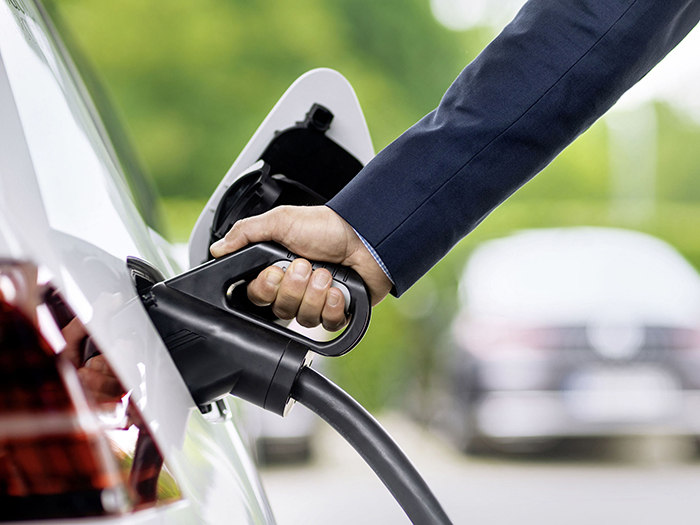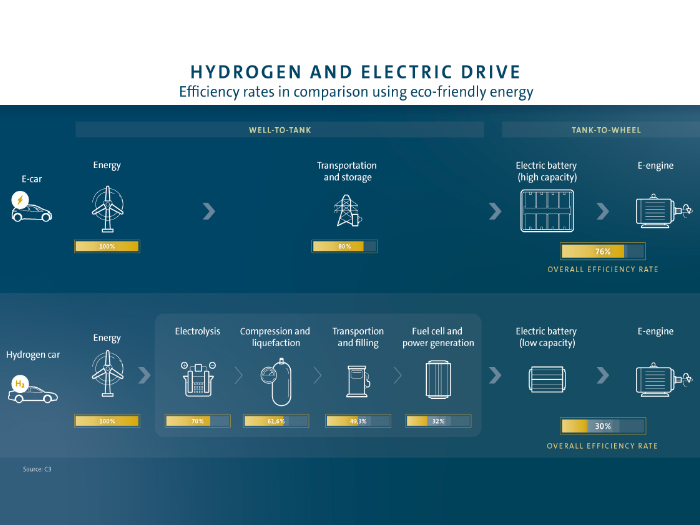Fuel cells or batteries for the cars of the future?
Hydrogen-powered cars have greater ranges and are easier to refuel than electric cars, but are more expensive to purchase and operate: these are the findings of a comparative study.
Pure electric and fuel cell vehicles: we are talking about pretty small numbers for now, but this is destined to change, with a decrease of the share of conventional vehicles powered by combustion engines, and a growth of those fuelled with electricity.
The use of hydrogen as an alternative fuel is an open question. Fuel cells are a technology which uses hydrogen to produce electricity in the car, in order to feed the vehicle’s electric engine. The Volkswagen Group’s vision, on the other hand, is clearly focused on the use of batteries. But which of these solutions is the best? This is the question that the analysts from Horváth&Partners tried to answer with their study “Automotive Industry 2035 – Forecasts for the Future”, which analyses the scenario for the years to come, with comprehensive considerations ranging from reasons for purchase to the different solutions.
The two phases of electric mobility
The research found that the electric car market will go through two distinct phases: the first will last until 2023-2025, with manufacturers making great efforts to help the spread of zero emission vehicles, a choice dictated mainly by strict CO2 emissions standards, meaning that significant investment will be required.
The second will then last until 2035 and will see electric cars becoming increasingly affordable, as opposed to vehicles with combustion engines, which will become more expensive for at least two reasons: the introduction of Euro 7 standards, and taxation of CO2 which, regardless of the form it takes, will make fossil fuels even more expensive. The price difference will therefore decrease.
Management Costs

Having an electric car means spending less on the energy required to drive it, but also lower service costs, as many of the components subject to wear or requiring maintenance in traditional vehicles (such as oil and filters) are not present.
Depending on the model and on the electricity prices in the individual countries, the study suggests that with an electric car, drivers will save between 400 and 600 Euros on “fuel” and between 200 and 400 Euros on maintenance every year.
Limits to the Spread
When defining the scenario, less rational elements, such as range anxiety and the need to increase charging speeds, must also be taken into account. According to the analysts, both of these issues will lose their relevance in the second phase, thanks to greater ranges as the technology constantly advances, and widespread distribution of charging points, which will minimise the fear of running out of “juice”.
Finally, there is the CO2 emissions issue: currently, the electricity used to produce electric vehicles does not always come from renewable sources, and we therefore cannot yet talk about carbon neutral cars. Various studies have concluded that as things stand today, the total CO2 footprint of an electric car is lower than a vehicle with an internal combustion engine only after it has covered 100,000 km. But this figure will also change in the next few years, thanks to the use of more renewable energy.
Energy Efficiency

Moving onto the technical aspects, the study by Horváth&Partners compared the level of energy efficiency of BEVs and fuel cell vehicles. They found that battery-operated vehicles had an overall efficiency of 70-80%, while for hydrogen-powered vehicles it was between 25 and 35%.
In the first case, the efficiency losses are around 8% in the energy transport phase from the source to the batteries, and a further 18% when it is converted to allow its use by the engine. For the second case, on the other hand, we have to take into account losses of around 45% in producing the hydrogen through electrolysis; of the remaining energy, a further 55% is lost when the fuel cells inside the car turn this hydrogen back to the electricity which is finally used by the electric engine.
The cost issue
According to the analysts, the application of hydrogen in the transport sector makes sense in specific contexts – such as for trucks and buses covering long distances – rather than as main player in global mobility. Battery weight, range and fuelling time play a decisive role when it comes to heavy vehicles, and considering the relatively small numbers, current dedicated service stations can be converted for hydrogen refuelling with a manageable effort.
In conclusion, fuel cell vehicles have many advantages, above all the already mentioned range and refuelling times, but compared to electric vehicles they are less efficient in terms of cost. More specifically, it currently costs between 9 and 12 Euros with a hydrogen vehicle or between 2 and 7 Euros with an electric vehicle to drive 100 km, depending on energy prices in the individual countries.
Source: Volkswagen AG
